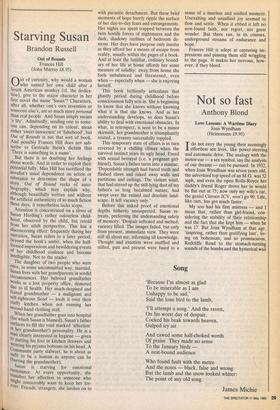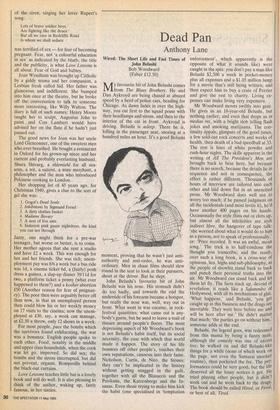Not so fast
Anthony Blond
Love Lessons: A Wartime Diary Joan Wyndham (Heinemann £9.95) T do not envy the young their seemingly effortless sex lives, like power-steering and automatic drive. The analogy with the motor-car — a sex symbol, say the analysts of our dreams — can be pursued. In 1932, when Joan Wyndham was seven years old, the advertised top speed of an M.G. was 52 mph, and even the open Rolls-Royce her daddy's friend Roger drove her in would be flat out at 75; now only my wife's car, the genial Citroen 2CV, won't go 90. Life, like cars, has got much faster.
My son had his first mistress — and I mean that, rather than girl-friend, con- sidering the stability of their relationship and the fact that she kept him — when he was 17. But Joan Wyndham at that age, 'inspiring, rather than gratifying lust', liv- ing on bohemian, and so promiscuous, Redcliffe Road to the stomach-turning sounds of the bombs and the hysterical wail of the siren, singing her lover Rupert's song:
Lots of brave soldier boys Are fighting like the deuce • But all we care in Redcliffe Road Is whom we shall seduce
was terrified of sex — for fear of becoming pregnant. Fear, not 'a colourful education in sex' as indicated by the blurb, the title and the publicity, is what Love Lessons is all about. Fear of God and babies.
Joan Wyndham was brought up Catholic by a giddy mama and her companion, a Lesbian freak called Sid. Her father was glamorous and indifferent. She bumped into him once at the theatre, but he broke off the conversation to talk to someone more interesting, like Willy Walton. The diary is full of such names: Henry Moore taught her to sculpt, Augustus John to paint and Con Lambert would have advised her on the flute if he hadn't just passed out.
The good news for Joan was her uncle Lord Glenconner, one of the sweetest men who ever breathed. He bought a restaurant in Oxford for his grown-up niece and her current and probably everlasting husband, Shura Shivarg, a shlemiehl for all sea- sons, a wit, a satirist, a wine merchant, a philosopher and the man who introduced Pekinese cooking to London.
Her shopping list of 45 years ago, for Christmas 1940, gives a clue to the sort of gel she was:
1. Gogol's Dead Souls 2. Inhibitions by Sigmund Freud
3. A dirty clothes basket 4. Madame Bovary 5. A nest of live ants 6. Indecent pink gauze nightdress, the kind you can see through
Jazzy, one might think for a pre-war teenager, but worse or better, is to come. Her mother agrees that she rent a studio and have £2 a week. This was enough for her and her friends. She was rich; unem- ployment pay was 8/6 a week but a bus ride was id, a cinema ticket 6d, a (fairly) posh dress a guinea, a slap-up dinner 39/11d for two, a platform ticket a penny (what ever happened to them?) and a kosher abortion £50 (Another reason for fear of pregnan- cy). The poor then were arguably better off than now, in that an unemployed person then could blow his or her weekly money on 17 visits to the cineina; now the unem- ployed at £30, say, a week can manage, at £2.50 a throw, only 12 shows in a week.
For most people, pace the bombs which the survivors found exhilarating, the war was a bonanza. English people spoke to each other. Food, notably in the middle and upper class households, when the cook was let go, improved. So did sex; the bombs and the sirens interrupted, but did not prevent, orgasm. Rompsville behind the black-out curtains.
Love Lessons teaches little but is a lovely book and will do well. It is also pleasing to think of the author, waking up, fairly famous, in her sixties.















































 Previous page
Previous page